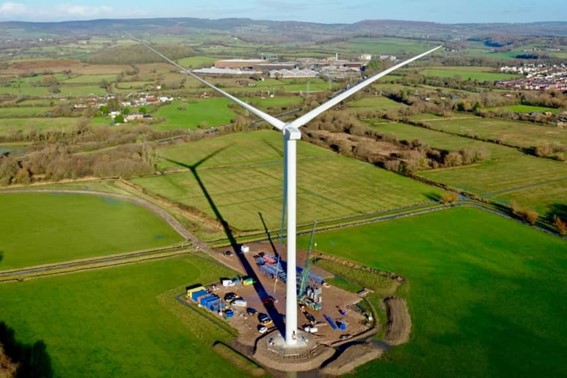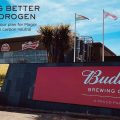To brew the most sustainable beers in the world. This is the goal set by multinational brewer Budweiser Brewing Group, which has just announced that its UK breweries are aiming to have net zero operations by 2026, as part of a new global ambition to achieve net zero across its value chain by 2040.
And its European business is contributing to the company’s new ambition to have net zero operations in five major breweries by 2028, reducing annual CO2 emissions by 110,740 tons, equivalent to the emissions of almost 35,000 cars. The British company Budweiser Brewing Group will be the first to achieve this goal with its Magor and Salmesbury breweries.
Indeed, Budweiser Brewing Group already brews every can, bottle and keg in the UK with 100% renewable electricity from its own wind turbine and two solar farms. The brewer has also eliminated plastic rings from its entire portfolio and has met its goal of brewing with 100% British-grown barley, reducing carbon emissions and championing local agriculture. In addition, last September, Budweiser Brewing Group partnered with Rusal, En+ Group, Canpack, Elval to launch a pilot to produce five million cans with the lowest carbon footprint for a can of AB InBev beer produced in Europe.
However, for the hospitality industry to stay on the path to net zero by 2050, greenhouse emissions would need to be halved by 2030 which is a real challenge for many companies. With 35% of the UK’s greenhouse gases coming from food and beverage production and consumption, Budweiser Brewing Group has partnered with Footprint to launch a report identifying the challenges facing the hospitality sector in getting to net zero.
According to the aforementioned report, a growing number of hotel companies have begun preparing for net-zero, however, many are still unsure where to start. Mauricio Coindreau, Head of Sustainability and Procurement, Budweiser Brewing Group argues that “we are enormously proud that in 2026 our Magor and Samlesbury breweries will be the first to net-zero operations in Europe, bringing us one step closer to achieving our global net-zero ambition across our entire value chain by 2040. As a global company, we know we can make a positive difference and set a good example, which we hope will inspire others to follow and help make significant changes for the better.”
Charles Miers, Co-CEO, Footprint adds, “This collaboration with Budweiser has provided us with invaluable insights into the challenges facing hotel companies as they join the race to net zero. The report has identified that we have a long way to go.”
For AB InBev, the strategy to support the ambition of achieving net zero operations in Europe is based primarily on changing fuel sources and increasing energy efficiency. The company has identified 29 different technologies, which show great promise to contribute to net zero ambition, and several have already been implemented.
To unlock the potential of green energy, AB InBev’s UK business, Budweiser Brewing Group, is exploring the deployment of zero-emission green hydrogen at the Magor brewery in South Wales, one of the UK’s largest breweries. This project envisages hydrogen production facilities that will include a battery, a hydrogen storage unit and a hydrogen refueling station used for heavy-duty vehicles.









